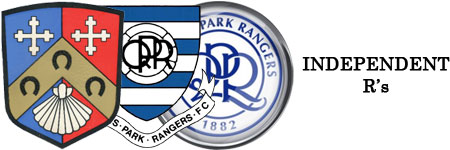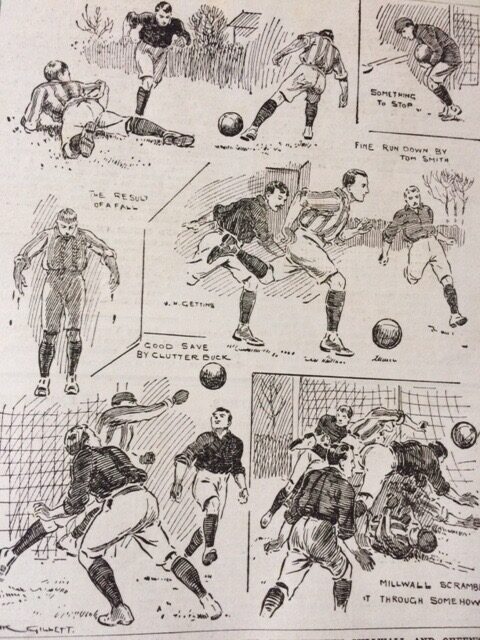QPR’s 1899/1900 FA Cup involvement began on 23rdSeptember with a 4-2 home win against London Welsh.
Fulham, West Hampstead, the Civil Service and Luton Town were then defeated in the qualifying rounds. A famous victory over Wolverhampton Wanderers in round one followed.
The Rangers were then drawn against Millwall Athletic in round two. The match at Kensal Rise was postponed after the referee, a Captain Simpson, had declared the frozen pitch to be unplayable. But by this time thousands of fans had assembled outside.
This report appeared in ‘The Sporting Life’: ‘Notwithstanding the fact that Mr Mousell, the secretary of Queen’s Park Rangers, sent telegrams to various stations soon after one o’clock to the effect that Captain Simpson had examined the ground and found it totally unfit for play, a large crowd gathered at Kensal Rise.
The home supporters, of course, knew nothing about a postponement until arriving at the gates, which they found closed, but luckily a wire to Millwall was just in time to stop the special train from that station.
A lot of disappointment was evidenced on both sides, but it would certainly have been madness to play on such hard ground. For the first time the telegraphic officials had made excellent arrangements to cope with the large number of wires which would certainly have been sent had this game taken place.’
And this account from ‘The Daily Telegraph & Courier’:‘Although 15,000 people who assembled at Kensal Rise to see a football match between the Queen’s Park Rangers and Millwall were disappointed, play being abandoned on account of the weather, a few of the privileged ones witnessed a scrimmage, in which a constable and a young architect were the chief performers.
The crowd returning to the Kensal Rise Railway Station met the crowd who were leaving it, and the consequence was a good deal of confusion.
To add to the misery people’s tempers were a little upset at hearing that the match was postponed. The police and railway officials had all their work cut out to arrange the opposing throngs, and the young man, who appeared at Harlesden, was said to have been annoyed at the efforts to restrain his advance, so he dashed forward, and tried to force his way to the platform.
A policeman seized him, but the prisoner struck him sharply and then tried to get away. However, a porter came to the assistance of the law, and the disorderly passenger was shut up in the waiting room.
The defendant said that he was urged on by the crowd behindand made a grab for the constable to save himself from falling, but the intention of his action was mistaken. He did not strike the policeman, but the latter seized him by the throat. Mr Bird fined him 10s and costs.’
A thaw began to take place in London and the game was re-scheduled for the following Saturday. Before a crowd of around 12,000, a match report later appeared in ‘The Kilburn Times’:
‘The Rangers played a team consisting of; Clutterbuck, Knowles, McConnell, Crawford, Hitch, Keech, Tom Smith, Haywood, Bedingfield, White and Hannah, whilst Mr F. H. King refereed.
The ground had recovered in a wonderful manner, and “looked” in fair condition. What had been pools of water were now soft beds of peat.
Crawford with his usual luck, won the toss, and elected to defend the College Park goal, Gettins setting the ball in motion exactly to time.
It was a typical cup fight, the ball travelling to and fro very rapidly. The Rangers appeared to get into their stride first. Then back went Millwall, McConnell neatly robbing Gettins, who had become dangerous.
The Rangers renewed their attack upon Millwall’s goal, and Bedingfield got through the defence with a magnificent bit of play, but when everyone was prepared to see the ball in the corner of the net it was seen that he had shot into the hands of Cox, and a splendid chance was lost.
The Rangers were playing by far the prettier football. Their combination was high above that of their opponents but try as they might could not get the ball past Cox, who even surprised his own comrades and supporters by his wonderful saves.
However, the Rangers did not have it all their own way, Millwall made one or two bursts away, and one of these by Nicholls nearly brought about the downfall of the Rangers goal. Nicholls sent in a centre and McConnell in kicking away, sent the ball almost in his own goal, Clutterbuck fisting it out.
Some of the fouls were disgraceful, Keech being the first to feel any discomfort from their treatment. The referee had to caution one of the East Enders.
Haywood was playing a grand game, without doubt he was the best player on the field. He tried the abilities of Cox upon several occasions and one shot was especially notable, but Cox saved in brilliant style.
At last the visitors broke away and the ball was seen in the net, with Clutterbuck and Crawford appealing for “offside”. To the relief of the home supporters, after consulting both linesmen, the referee awarded a free kick to the Rangers.
The play from now greatly deteriorated and little combination was seen on either side. Bad fouls were of frequent occurrence. Hereabouts Allen kicked out to save from Tom Smith and Bedingfield again got through but was brought down in a dastardly manner by one of the backs, and from the free kick awarded, White headed behind.
Just before half-time, Hannah had the chance of the match, getting through the defence and no one but the goalkeeper to pass. He shot very tamely at long range yards wide, and thus a glorious chance was lost. Half-time came with the score-sheet blank.
The second-half had not commenced many minutes when rain commenced to fall; the ground was a regular quagmire, and it would not have surprised one if the game had been stopped.
Millwall began to press for the first time in the match and forced their first corner, followed by another immediately afterwards, but both were got away easily.
Bedingfield at last secured and made another rush, but Cox again proved invincible. Back went the ball to the other end, and one of the Rangers badly fouled a visitor. From the free kick resulting, Millwall scored their first goal.
Directly afterwards a very serious accident happened to Haywood, and it was seen that the Rangers’ chance had now disappeared.
Millwall tried hard to increase their score, but the Rangers’ ten men still struggled on, Hitch getting in one shot which was only inches too high.
A nasty fog now came on, and it became a question as to whether the game could be finished.
A few minutes from the end, Millwall got near to Clutterbuck and after a tricky bit of play, Gettins sent in a shot from close range which Clutterbuck could not have seen, and Millwall two goals to the good.
The whistle sounded directly afterwards, leaving Millwall to represent the South against Aston Villa on Saturday next.’
Steve Russell
(The wonderful artwork shown above was taken from a copy of ‘The Daily Graphic’. Also, my thanks to Colin Woodley foruncovering the various newspaper reports)

